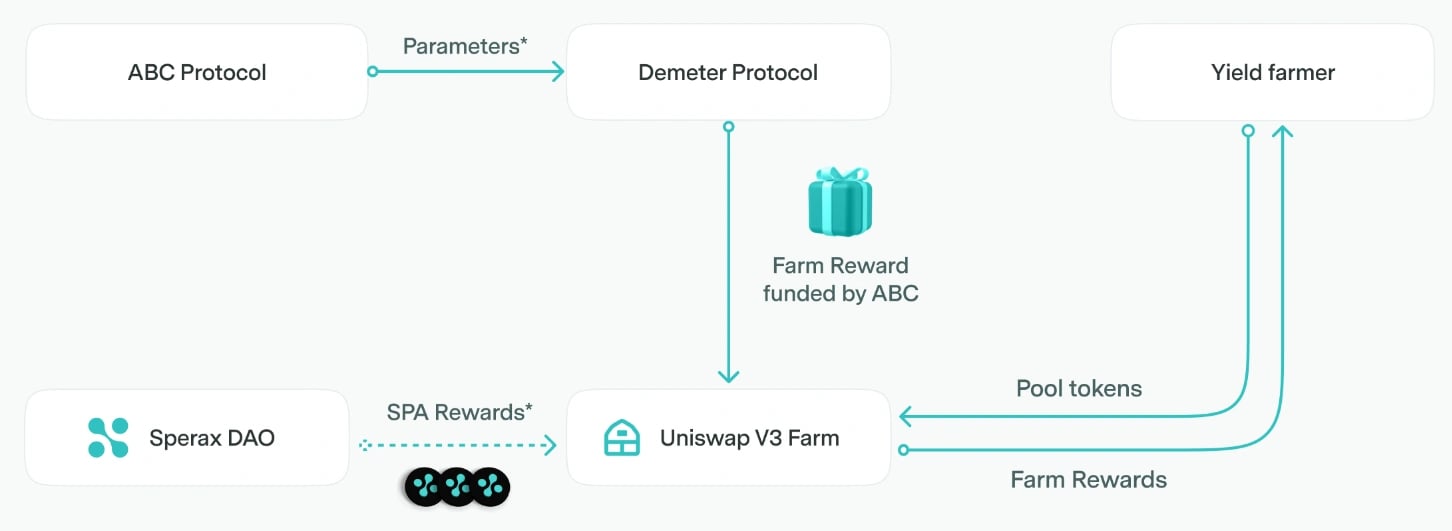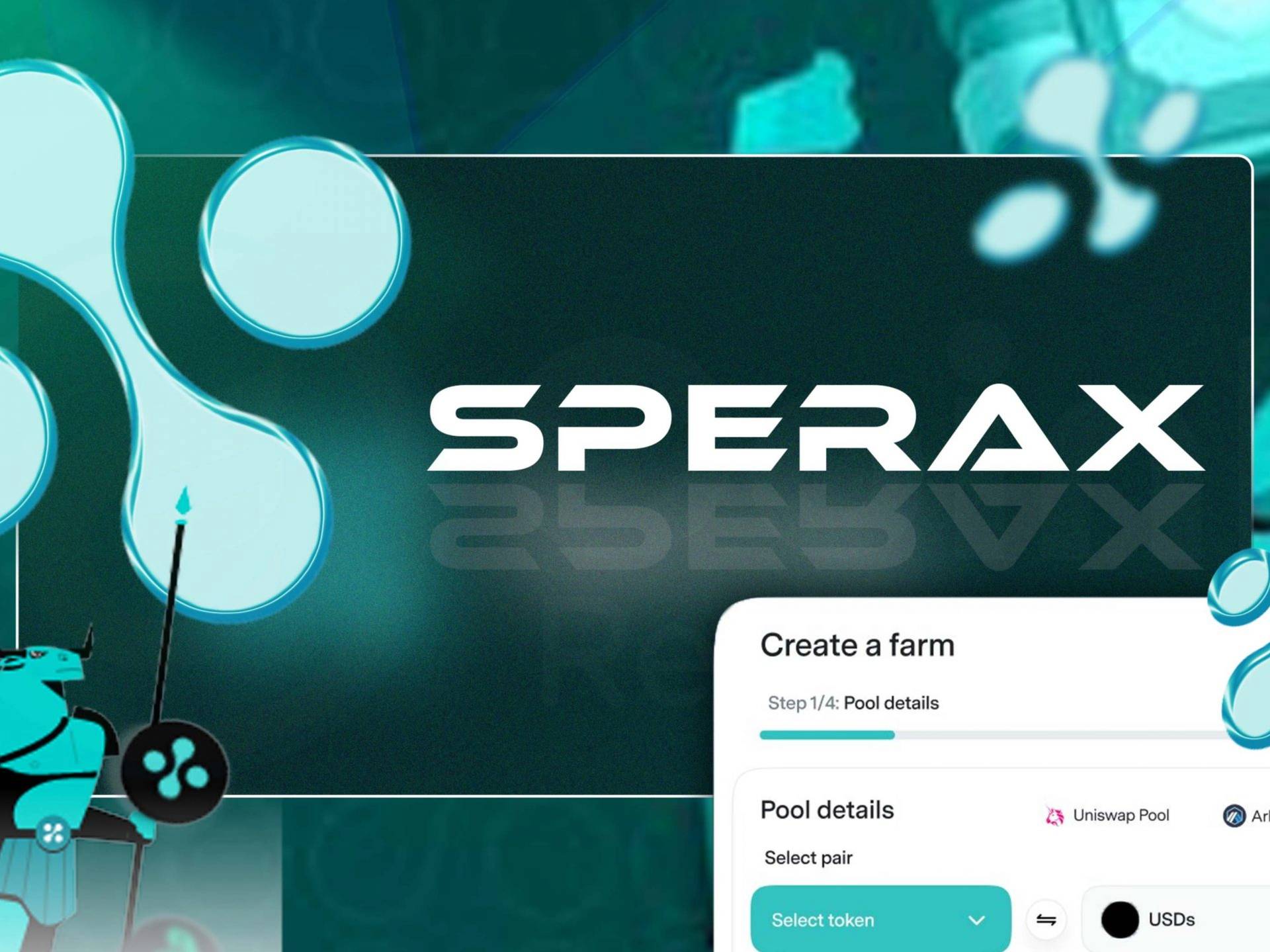위키 구독하기
Share wiki
Bookmark
Sperax
0%
Sperax
Sperax는 Arbitrum에서 완전히 지원되는 자동 수익 창출 레이어 2 알고리즘 스테이블 코인인 USDs(SperaxUSD)를 지원하는 스테이블 코인 프로토콜입니다. [1]
개요
Sperax는 2020년에 출시되었으며 이후 2021년 12월에 자동 수익 창출 스테이블코인인 USDs를 만드는 것으로 전환했습니다. USDs는 탈중앙화 금융(DeFi) 공간에서 기존 스테이블코인의 한계를 해결하는 것을 목표로 하는 스테이블코인입니다. CDP 스테이블코인과 같은 100% 지원 모델의 이점을 결합하는 동시에 법정화폐 지원 스테이블코인과 같은 확장성 이점을 추가합니다. 이는 USDs를 확장 가능하고 신뢰할 수 있으며 탈중앙화되도록 목표로 하는 온체인, 상환 기반 설계를 통해 달성됩니다. [2][3]
SPA 토큰
Sperax 생태계는 SPA라는 거버넌스 및 가치 축적 토큰을 활용합니다. SPA를 보유한 개인은 토큰을 스테이킹하여 veSPA(Vote-Escrowed SPA)를 받을 수 있으며, 이를 통해 스테이킹 보상을 받고 Sperax 거버넌스에서 투표권을 통해 프로토콜 수익을 관리할 수 있습니다. 현재 오프체인 거버넌스가 활성화되어 있으며, veSPA 보유자로 대표되는 커뮤니티는 수익률 전략, 적격 담보, 새로운 제품 기능과 같은 USDs 프로토콜의 다양한 측면을 제어할 수 있습니다. [2]
SPA 게이지
Demeter.sperax.io에서 찾을 수 있는 SPA 게이지는 아비트럼 유동성을 강화하고, 신규 프로젝트를 지원하며, 아비트럼 커뮤니티를 보호하기 위해 설계되었습니다. 이 도구는 SPA 토큰을 USDs 거래 쌍에 분배하는 보상 메커니즘을 도입합니다. SPA 게이지를 통해 모든 아비트럼 DAO는 USDs를 사용하여 토큰의 온체인 유동성을 시작하거나 향상시킬 수 있습니다. USDs로 거래 쌍을 생성함으로써 프로젝트는 게이지에서 SPA 보상에 자동으로 액세스할 수 있습니다. [12]
SPA 게이지는 매달 미리 결정된 양의 SPA를 할당합니다. veSPA(스테이킹된 SPA) 보유자는 주간 투표에 참여하여 USDs 풀 간에 SPA 보상이 분배되는 방식을 결정합니다. 또한 특정 풀에 투표하는 대가로 DAO로부터 보상을 받을 수도 있습니다. veSPA 보유자는 SPA 보상 분배를 결정하기 위해 주간 투표에 참여하여 투표로 풀의 "게이지 가중치"를 높입니다. 또한 SPA 게이지 시스템을 통해 DAO는 특정 게이지에 투표하는 대가로 veSPA 보유자에게 보상을 제공할 수 있습니다. [12]
주요 기능
- 자체 보관: 중앙 집중식 기관과 관련된 위험을 제거하고 자산을 보호합니다.
- DeFi 생태계 접근: 상호 운용성 및 공유 유동성을 촉진하는 탈중앙화 금융 생태계에 참여하여 사용자의 토큰을 빌더와 투자자에게 개방합니다.
- 자동화된 마켓 메이킹: VC, 마켓 메이커 또는 중앙 집중식 거래소에 의존하지 않고 공정한 토큰 출시를 실행합니다. 수수료는 시장 중개인이 아닌 커뮤니티로 돌아갑니다.
- 다중 DEX 지원: SPA Gauge는 DEX에 구애받지 않으므로 모든 DEX에서 USDs 쌍에 연결할 수 있습니다. 두 번째 통합은 Camelot과의 통합으로, Arbitrum 생태계 내의 여러 DEX에서 공정한 출시를 가능하게 합니다.
게이지 참여하기
DAO는 두 가지 방법으로 SPA 게이지에 참여할 수 있습니다. [12]
- Demeter.sperax.io를 통해 USDs 또는 SPA 쌍을 시작합니다.
- 제안서(SIP)를 제출하고 사용자 정의 전략 또는 풀에 대한 스냅샷 투표에 참여합니다.
Auto-Yield
Auto-yield는 USDs 스테이블코인의 기능으로, 사용자가 아무런 조치를 취하지 않아도 보상을 받고 지갑 잔액을 늘릴 수 있습니다. 이 기능은 USDs 발행에 사용된 담보를 다른 감사된 DeFi 프로젝트에 배포하여 수익을 창출합니다. 보상 토큰 및 풀의 스왑 수수료 형태로 발생하는 수익은 USDs 보유자와 SPA 스테이커 간에 공유됩니다. 수익의 50%는 새로운 USDs를 발행하고 이를 지갑에 USDs를 보유한 모든 사람에게 분배하는 데 사용되므로 가스비 없이 수익을 얻을 수 있습니다. 목표 수익률은 연간 11%이며, 그 이상으로 발생하는 추가 수익은 시장 침체기에 APY를 지원하는 데 사용됩니다. 스테이킹된 USDs는 자동 수익 분배 대상이 아니며, 계약 주소가 아닌 외부 소유 계정(EOA) 지갑의 USDs 보유자만 7일마다 정기적인 자동 수익을 받게 됩니다. [4]
수익 전략
커뮤니티는 수익 창출을 위한 다양한 방법을 제안하고 잠재력과 위험 수준을 평가합니다. 그런 다음 커뮤니티는 담보를 배치할 풀 또는 팜을 투표합니다. 현재 수익 창출에 사용되는 전략은 다음과 같습니다. [4]
- Saddle - vault-core의 FRAX 및 USDC가 Saddle FRAX-USDC-BP 풀에 예치되고 LP 토큰이 Saddle 게이지에 스테이킹됩니다. 이 전략은 FRAX 및 USDC의 수수료와 SDL의 팜 보상을 통해 수익을 창출합니다.
- Frax - vault-core의 FRAX 및 VST가 Curve FRAX-VST 풀에 예치되고 LP 토큰이 Frax 게이지에 스테이킹됩니다. 수익은 FRAX 및 VST의 수수료와 FXS 및 VSTA의 팜 보상을 통해 창출됩니다.
- Stargate - vault-core의 USDC가 Stargate USDC 풀에 예치되고 LP 토큰이 Stargate 팜에 스테이킹됩니다. 수익은 USDC의 수수료와 STG의 팜 보상을 통해 창출됩니다.
- Aave - vault-core의 DAI가 Aave DAI 시장에 대출됩니다. 수익은 DAI의 수수료와 Aave의 보상을 통해 창출됩니다.
스테이킹
SPA 토큰 보유자는 Arbitrum 또는 Ethereum 네트워크에서 토큰을 잠가 양도 불가능한 veSPA 토큰을 받는 스테이킹에 참여할 수 있습니다. veSPA의 양은 잠금 기간에 비례하며, 잠금 기간이 길수록 더 많은 보상을 받습니다. 스테이킹 보상은 사용자의 veSPA 잔액을 기준으로 분배되며, 수익 공유 보상, 수수료 보상, 인센티브 보상이 포함됩니다. 이 보상들은 원래 USDs로 생성된 후 분배 전에 SPA 토큰으로 교환됩니다. [5]
- 수익 공유 보상: USDs 프로토콜에서 생성된 수익의 25%
- 수수료 보상: USDs 발행 및 상환으로 인한 수수료 수입의 100%
- 인센티브 보상: 스테이킹 프로토콜을 강화하기 위해 재단에서 후원
거버넌스 프로토콜이 시작되면 투표권도 사용자의 veSPA 잔액에 따라 결정되며, 더 오랜 기간 동안 잠근 사용자가 더 많은 투표권을 갖게 됩니다. 그러나 veSPA 잔액은 시간이 지남에 따라 감소하므로, 스테이커는 잠금 기간을 연장하거나, 더 많은 SPA를 잠그거나, SPA 보상을 재스테이킹하여 veSPA 잔액과 보상을 늘릴 수 있습니다. [5]
유동성 채굴
Demeter 프로토콜을 통해 사용자는 DAO의 네이티브 토큰에 대한 탈중앙화 거래소 유동성 풀을 시작하고 관리할 수 있습니다. 이 프로토콜은 Demeter 활성 팜 대시보드에 화이트리스트 등록, SPA 게이지에서 고정 SPA 배출, USDs 또는 SPA와 페어링된 팜에 대한 할인된 출시 수수료를 포함하여 풀을 시작하고 관리하기 위한 엔지니어링, 마케팅 및 재정적 지원을 제공합니다. 사용자는 Sperax UI를 통해 UNI-V3 SPA-USDs 풀에 유동성을 제공하여 LP 토큰을 생성할 수 있으며, 이 토큰은 보상을 위해 팜 계약에 스테이킹할 수 있습니다. 사용자는 추가 보상과 보장된 최소 APR을 위해 LP 토큰을 잠글 수 있지만, 팜을 나가기 전에 21일의 쿨다운 기간을 시작해야 합니다. [6]
거버넌스
Sperax 오프체인 거버넌스 프로세스는 프로토콜에 대한 제안 제출, 논의 및 투표를 위한 3단계 프로세스를 포함합니다. 첫 번째 단계는 Sperax Discord 채널에서 아이디어를 공유하고 논의하는 캐주얼 아이디어 구상입니다. 두 번째 단계는 Sperax 거버넌스 포럼에 공식 제안을 제출하고 최소 48시간 동안 논의하는 거버넌스 제안입니다. 세 번째 단계는 veSPA 토큰을 보유한 커뮤니티 구성원이 제안에 투표할 수 있도록 투표를 생성하는 스냅샷 투표입니다. 제안은 50% 이상의 "찬성" 투표를 받아야 하며, 통과하려면 최소 2천만 veSPA 투표의 정족수를 충족해야 합니다. 통과되면 Sperax 개선 계획(SIP) 단계로 이동하여 구현됩니다. 통과하지 못하면 재제출하기 전에 쿨다운 기간을 거칩니다. [7]
바이백
Sperax 바이백 계약은 SPA 토큰을 다시 구매하는 프로세스를 분산화하는 동시에 프로토콜 수익으로 USDs의 총 고정 가치(TVL)를 높이도록 설계되었습니다. 사용자는 계약을 통해 SPA로 USDs를 직접 구매할 수 있습니다. 구매할 수 있는 USDs는 발행/상환 수수료와 수익이라는 두 가지 소스에서 나옵니다. 다시 구매한 SPA의 50%는 veSPA 보유자에게 보상으로 분배되고 나머지는 소각됩니다. 프로토콜 수익은 여러 토큰으로 수집되어 USDs로 변환되고 일부는 바이백 계약으로 전송되고 나머지는 자동 수익 준비금으로 이체됩니다. 프로토콜 수수료도 USDs로 수집되어 바이백 계약에 예치됩니다. 모든 사용자 또는 외부 지갑은 SPA를 USDs로 판매할 수 있으며, 받은 SPA의 50%는 소각되고 나머지 50%는 veSPA 보상자에게 전송됩니다. 수익 공유 및 소각 비율은 거버넌스를 통해 변경할 수 있습니다. [8]
Demeter 프로토콜
Demeter 프로토콜은 DAO(탈중앙화 자율 조직)가 탈중앙화 거래소 유동성 풀을 쉽게 시작하고 관리할 수 있도록 하는 도구입니다. 사용자 친화적으로 설계되었으며 코딩 지식이 필요 없습니다. 첫 번째 버전인 Demeter V1을 통해 사용자는 Uniswap V3에서 인센티브 유동성 풀을 시작할 수 있으며, 향후 버전에서는 다른 주요 탈중앙화 거래소에서 사용자 정의 유동성 형태를 지원할 예정입니다. Demeter는 현재 Arbitrum에서 사용할 수 있으며 곧 Optimism, Polygon, Ethereum과 같은 다른 블록체인으로 확장될 예정입니다. Demeter는 팜 출시를 위한 엔지니어링, 마케팅 및 재정적 지원을 제공하며, USDs 또는 SPA에 대한 팜 출시 시 할인된 수수료와 가시성을 높이기 위한 화이트리스트 팜 대시보드를 제공합니다. 팜 출시 수수료는 SPA 토큰을 소각하는 데 사용되어 SPA 공급량을 줄이고 가치를 높이는 데 도움이 됩니다. [9][10]
 역사
역사

Camelot 통합
2023년 4월 21일에 발표된 Camelot 통합은 Camelot LP 토큰의 스테이킹을 가능하게 하고, Demeter를 통해 수익률 팜 생성을 촉진하며, Demeter를 통해 SPA 배출을 장려합니다. 중요한 것은 유동성 비용을 줄이고 기본 DAO 토큰에 대한 매도 압력을 완화한다는 것입니다. 또한 이 협력을 통해 Demeter의 SPA Gauge는 여러 DEX에서 작동할 수 있게 되어 이러한 기능을 갖춘 최초의 Arbitrum 기본 유동성 인센티브 시스템이 되었습니다. 또한 온체인 유동성을 추구하는 프로젝트는 Demeter를 활용하여 거버넌스 토큰을 USDs에 고정하고 SPA Gauge에서 SPA 보상을 받을 수 있습니다. 이 접근 방식은 인플레이션과 배출로 인한 매도 압력이라는 두 가지 중요한 경제적 힘을 완화하여 DAO 토큰 지출을 줄이고 가치를 보존하는 것을 목표로 합니다. [13]
코인베이스 상장
2023년 5월 3일, 코인베이스는 아비트럼 네트워크(ERC-20 토큰)에서 Sperax (SPA)를 '실험적' 라벨로 지원한다고 발표했습니다. 코인베이스 및 코인베이스 거래소에서 SPA 거래는 자산의 적절한 공급을 확립하기 위해 단계적으로 출시되었습니다. [14]
USDs 2.0
2023년 7월 4일, Sperax는 프로토콜을 탈중앙화하고 투명성과 개방성을 포용하기 위해 스마트 계약 아키텍처를 발전시킬 것이라고 발표했습니다. 이번 업그레이드는 USDs 프로토콜을 기반으로 구축하는 개발자들에게 신뢰를 주기 위해 거버넌스가 필요 없는 기능을 도입합니다. 또한 변경 사항에 대한 거버넌스 제안이 필요한 기능은 제안된 변경 사항에 대한 적절한 조정 시간을 프로토콜 참가자에게 부여하는 시간 잠금을 구현합니다. [15]
주요 프로토콜 개선 사항
이번 업그레이드는 다음과 같이 기존에 중앙 집중화되었던 여러 기능을 탈중앙화합니다.
- 수익률 전략에서 담보금 입금 및 인출.
- 수익률 전략에서 수확된 토큰 수확.
- 수확된 수익률 토큰을 USDs로 교환.
- 새로운 드리퍼 계약 도입.
- 적격 주소로 자동 수익 분배.
드리퍼 컨트랙트
드리퍼 컨트랙트는 리베이스를 위해 USD를 점진적으로 릴리스하는 것을 관리합니다. 시장에서 재구매한 상환 가능한 USD는 "드리퍼" 컨트랙트에 예치되어 초당 일정한 비율로 7일 동안 USD를 릴리스합니다. 자동 수익 분배는 마지막 분배 이후 최소 3일 간격 및 APR이 3%를 초과하는 조건을 포함합니다. 자동 수익의 최대 APR은 10%로 제한되며, 초과 수익은 향후 분배를 위해 예약됩니다. [15]
팀
- 엔지니어: Joe Yu
- 엔지니어: David Zhao
- 제품: Atreyee Bhaumik
- 마케팅 및 사업 개발: Alex Shaw
- 사업 개발: Elliot
자문위원
- 경제 자문위원: Marco Di Maggio
- 제품 자문위원: Subhajit
- 경제 자문위원: Nicolas Andreoulis
- Amber Group 공동 창립자: Late Tiantian Kullander
파트너십
잘못된 내용이 있나요?
